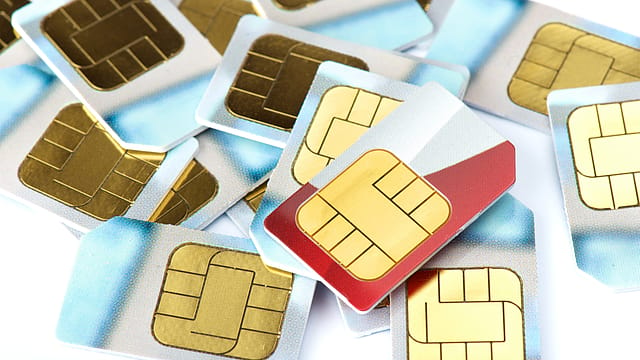Centre discontinues bulk SIM cards, makes KYC mandatory
ADVERTISEMENT

The government will make biometric and police verification mandatory for SIM card dealers as it looks to curb phone frauds.
In an effort to prevent spam calls and cyber frauds, bulk SIM cards will be discontinued, telecom minister Ashwini Vaishnaw says at a press conference in New Delhi.
"We have detected and deactivated 52 lakh fraudulent connections, and 67,000 dealers have been blacklisted. 300 FIRs have been registered. 17,000 mobile handsets have been blocked," says telecom minister Ashwini Vaishnaw.
"Through the SIM box, a lot of automated calls can be done. Fraudsters buy SIM cards in bulk and make fraudulent calls. After detailed study, we have decided that the bulk connection system will be discontinued and a system for proper business connections will be brought into place," explains Vaishnaw.
The Union minister says individual KYCs will become mandatory for those business connections. "For example, if 4,000 SIMs are taken by a company, KYC needs to be done for each employee," he adds.
A penalty of ₹10 lakh will be imposed on dealers for violating norms, Vaishnaw says. There are 10 lakh SIM dealers and they will be given sufficient time for police verification, the minister says.
These reforms are focused on user protection and reducing cyber frauds, claims Vaishnaw.
The Union minister says around 66,000 WhatsApp accounts were also blocked. This comes at a time when several users in India complained about getting missed calls on WhatsApp from unknown international numbers. Most of these calls come from phone numbers that begin with country codes such as +880 (Bangladesh), +251 (Ethiopia), +60 (Malaysia), +62 (Indonesia), +254 (Kenya), and +84 (Vietnam) among others.
Mobile phone users in India get nearly 17 spam calls on average per month, according to a Truecaller. The vast majority 93.5% of all spam in India are sales or telemarketing calls. As per Truecaller, one of the common scams in the country remains the KYC (know your customer) scam where fraudsters pretend to be a bank or digital payment service, asking for user KYC documents as mandated by the Reserve Bank of India (RBI).
Telecom regulator, the Telecom Regulatory Authority of India (TRAI), earlier directed telcos to use artificial intelligence (AI) and machine learning (ML) based anti-phishing systems to detect spam calls and messages.
TRAI has asked telecom service providers such as Reliance Jio and Bharti Airtel to curb the menace of 'unsolicited commercial communication'. Unsolicited Commercial Communication or UCC is a major source of inconvenience to the public and impinges on the privacy of individuals and there has been a consistent focus and drive to implement “UCC detect Solutions” in order to control spam on telecom networks, the regulator said earlier this year.
The regulator has also proposed a framework for sharing UCC data detected by service providers.